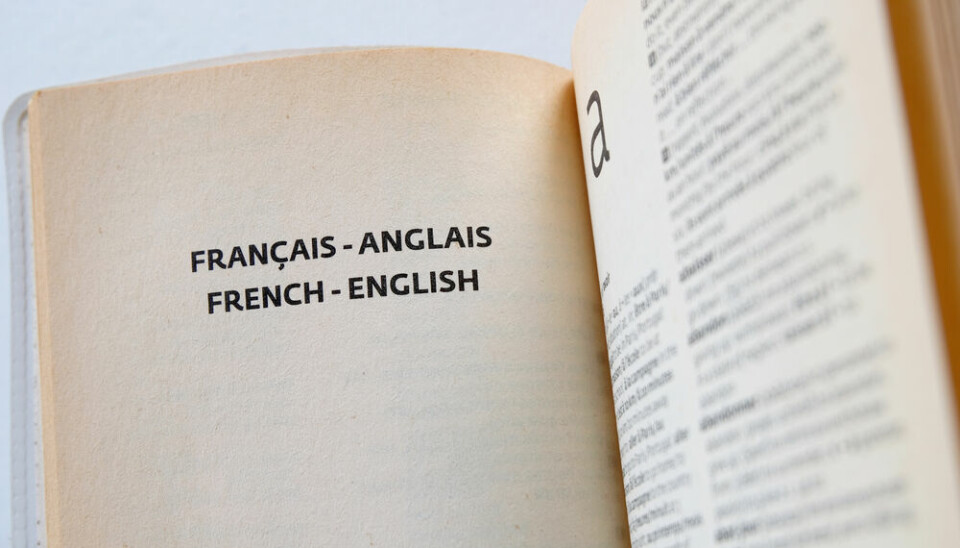Four types of words that English adopted from French
Try looking up the etymology of English words and you will find that a lot originate from old French
Half of English words came from French, claim linguists
sweeann/Shutterstock
Most English-speakers know some words that have come from French: cliché, rendez-vous, coup de grâce, to cite a few examples.
However, many more English words originated from across the Channel - in fact, linguists estimate that more than half of words in the English language are directly from French. It means English and French are considered the most connected Western languages in terms of sharing vocabulary.
It started in 1066 with the Norman invasion by William the Conqueror. French became the official language of the ruling class and was taught in schools until the Hundred Years’ War starting in the 14th century.
The most recent official introduction from French was the word ‘bustier’ in 1979, a form-fitting garment for women, with ‘bikini’, ‘purée’ and ‘camouflage’ being other 20th century examples of transmutation.
Below, we go through examples and types of words that English has ‘borrowed’ from French.
Military ranks
All the military ranks in English come from French. The word ‘rank’ itself originates from the old French rangue or ranc, which means rows, usually referring to classes in society.
‘Lieutenant’ comes from the combination of lieu (place) and tenant (holder), therefore meaning someone who took a position that was unoccupied before it was permanently filled.
Incidentally, tenant is where the term 'tenant' comes from too.
‘Captain’ comes from capitaine, ‘colonel’ is the same in both languages and ‘general’ comes from général.
Another interesting term is ‘cadet’, which means the youngest brother, hence why it refers to the trainees or students in the army. Cadet is likely to also be the source of the term ‘caddy’ in golf, the person who carries around the professional’s clubs and gives them advice.
Read more: ‘Anglicisms? They are French words we loaned to English after 1066’
Legal and governmental terms
Almost all legal terms come from French, except for a rare few that have Germanic origins .
Anthony Lacoudre, a binational lawyer who wrote the book L’incroyable histoire des mots français en anglais (‘The incredible history of French words in English’) says that “99%” of legal terms come from French.
The following are all words with French origins: administration, bailiff, crime, government, judgement, justice, minister, sentence, tax…
For example, ‘crime’ comes from the Latin crimen meaning charge, accusation or indictment. This became crimne in Old French and the ‘n’ was dropped when it was adopted into the English language.
The reason that such a high proportion of these terms come from French is because in 1066, there was no official justice system or system of government.
The words had to be taken from French because they simply did not exist in English.
Words ending in -ance or -ant
The endings of some words mean that they are very likely to have originated from French.
This is not always the case and does not always mean that the word exists in French. Sometimes, the word was adopted into English but did not survive in Old French and no longer exists outside of English.
However, words ending with -ance or -ant are likely to be from the other side of La Manche.
‘Arrogance/arrogant’, ‘elegance/elegant’, ‘importance/important’, ‘tolerance/tolerant’ and ‘extravagance/extravagant’ are examples.
These words are almost all originally from Latin, which then became French and then became English, which is why spellings, meanings and pronunciations change slightly - or sometimes - significantly along the way.
Read more: NFT, halloumi, wokism: New words in Larousse French dictionary 2023
Words taken from Norman
As the invaders in 1066 were Norman, they spoke a dialect which was different to Old French and this dialect seeped into English.
‘To assess’ comes from assesser rather than its Parisian counterpart évaluer, which is still used today.
The current French word for ‘improve’ is améliorer, but it originated from improver.
Finally, ‘to ensure’ comes from the Norman ensurer, hence why it differs from the French assurer.





























